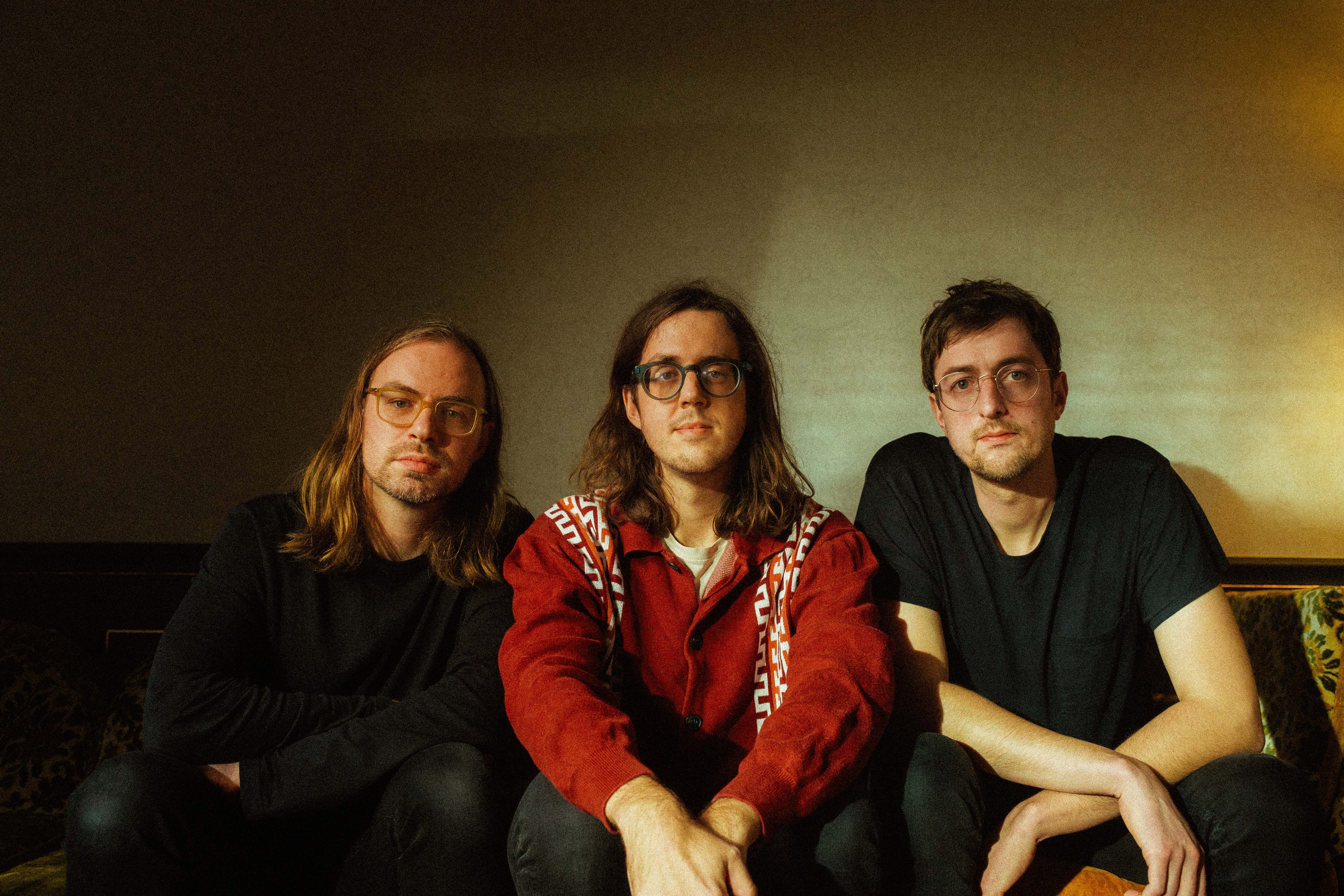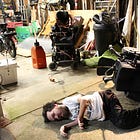An Interview with Dylan Baldi (Cloud Nothings)
Staying prolific, writing lyrics at the last minute, and running a marathon in every state.
Hello and welcome to ZERO CRED (formerly REPLY ALT), the world’s only music newsletter. Subscriptions are free, but you can also upgrade to a paid subscription for just a couple bucks a month which helps me greatly. It also gets you my weekly book column and other fun stuff.
It’s hard to say precisely how many albums Cloud Nothings have released over the last 15 years. Sure, there are the handful of critically acclaimed studio albums that fans know and love. But then there’s the mountain of grey-area material that tests the limits of what “counts” as an official, capital-A Album. A collaboration record with Wavves, a subscriber-only LP, an expanded debut EP, a pair of live albums, a plague year’s worth of monthly EPs, some stray loosie singles, and ohhhh how about two dozen or so live bootlegs released on Bandcamp.
This is all to say: Cloud Nothings mastermind Dylan Baldi has been incredibly prolific with the project since dropping out of college to focus on it full-time in 2009. And there’s more material on the way, with Final Summer, the band’s first release with Pure Noise Records, out next month. But even though Baldi has been a songwriting firehose, there’s rarely much sacrificed by way of quality. Whether it’s a Steve Albini-produced masterpiece or a four-track home recording, Baldi’s inimitable guitar work runs through all of it. It’s a style that takes lo-fi sounds and molds them, sometimes impossibly, into perfectly crafted pop hooks.
I recently had a conversation with Baldi about how he stays so productive, the effect of positive press, and his goal to run a marathon in every state.
The other day I asked the internet who is this generation’s Guided by Voices, meaning a really prolific guitar rock band, and a few people suggested you. Do you think of yourself as prolific?
Dylan Baldi: I mean, people just keep telling me we are, especially lately, so I’m sort of forced to be thinking about it that way. But I do tend to work on music all day, all the time. The channels of things like Bandcamp to release everything has made things easier. You can just pop something out there immediately and I like that. So yeah, I guess we are prolific. [Laughs]
How many songs would you say you have that you’ve never released?
I mean, there’s lots of bad ones. Usually I just don’t finish them if I start feeling like it’s not worthwhile. So there’s probably a bunch of unfinished junk sitting around, but I clean up the trash fairly often, so I just keep the good ones around.
What does writing look like for you? Are you just messing around on your guitar or is it more premeditated?
It depends. A lot of it is just messing around on a guitar, and that’s the kind of stuff that’ll end up on a Cloud Nothings record. But then I have other little things that I kind of put out on my own sometimes, just for free on Bandcamp or whatever, things that I’ll just fiddle around with and be like, “I’m gonna make a video game music record that’s all MIDI sounds.” But for the most part, I go in my basement with a guitar and just play guitar for a while and a song forms out of that.
How much do you prioritize the music writing versus the lyric writing?
I don’t think I’ve ever written lyrics first. They’re kind of just something that has to be on the song. I could make an instrumental record, I guess, but people want to hear words. [Laughs] I’ve been thinking about it more lately. I used to wait until the last second and be like, “Oh man, I gotta put some words on this!” Like, in the actual studio while we are paying for it.
I’m always amazed when I hear about people doing that. I would be so precious about the words.
Well, that’s the thing. It’s really stressful. That’s kind of an intense thing to do, to be like, “This is what I think,” you know? When you’re just playing music, it’s a little more abstract. You’re not writing words, you’re just playing guitar. That’s a lot easier for me to do. I feel less of myself is in it, in a way. But to put words to something, even if you’re not writing about your own life, you say the word “I” in a song and everybody thinks it’s you. And then this becomes about me in a way that I don’t necessarily want it to be.
Have you had fans connect to specific lyrics in a way that was surprising to you?
I don’t think anything’s surprised me. People just kind of connect to the big choruses that are all about being depressed and whatnot. I don’t not care about the words. It’s just kind of scary to me to write the words because that’s what people will latch onto. Like, there’s people with tattoos of some lyrics from a bad time or memory in my life, and that’s insane. Basically, my rule is: I just try not to write anything that feels embarrassing to say or sing.
You’ve been doing this band for 15 years now, which is an eternity in indie rock time. For better or worse, what change in music do you think has affected you the most?
I feel like when we were kind of coming up, I was very clearly influenced by the Pitchfork world. That’s what I was doing in high school. I was really into like Vivian Girls and Times New Viking and all these things that were kind of noisy and crappy-sounding. [Laughs] That kind of inspired me to be like, “I could do this.” I feel like that kind of stuff doesn’t quite get the press that it used to. That was what made it feel like a community. Not all these people knew each other or anything, but it did seem like there was some kind of unifying sound that united groups of people, and I feel like that’s something that has lessened over the years.
Do you feel there’s less of that communal space for music now?
I don’t. I just think there’s less of it in a big, public way. There’s lots of bands right now that kind of have that similar sound that I like, and there always have been, but there’s no outlet that’s focusing on it. Well, I guess that’s not true. There’s just no huge one, like the way Pitchfork was, but there’s lots of smaller ones like Post Trash and Rosy Overdrive.
Since your last album came out, Pitchfork and a lot of other publications have more or less gone under. Pitchfork has been very kind to pretty much all of your albums. You got the best new music thing twice. What impact do you think that had on your career?
That was maybe towards the end of the era when that would have been the most impactful. It was a thing where we played to nobody, we toured a lot but nobody cared, but then we put out Attack on Memory and that got the big Pitchfork review and then that whole tour sold out. I was like, “That’s insane that this thing can have that kind of pull.” And the next record, the shows got bigger. I feel like it wasn’t exclusively Pitchfork, but that was a big part of it, because that’s just what a lot of people were reading and almost developing their identities around.
Is there anything now that you think has that ability to increase an audience size like that?
If there is, I have no idea or I would be trying to focus on it. [Laughs]
Do you care about reviews of your work?
At this point I don’t think I care that much, just because I feel like what we’re putting out is up to my standard. At that point, I cared. Because I was like, we need some good reviews or else nobody’s ever gonna come see this band and I’m gonna have to go back to college or I don’t know what. Work at the gas station? But yeah, I still read music reviews and music writing all the time. I’m just a big music nerd, basically, so I’m pretty obsessed with all that stuff. I try not to read the things that are about me or where I think someone might be talking about me, just because I don’t need to pollute my brain with that.
What about interviews? You’ve had to do the press cycle every few years. Do you like doing press?
I like some of it. Like, this is going well.
I didn’t ask that to get my bread buttered!
No, no, I love this. [Laughs] But yeah, I think some of it’s good, some of it’s bad. It’s the same as everything.
Do you think you’ve gotten any better at it in the years you’ve been doing this?
I guess, probably. Just because I used to be more guarded about what I would say. I just didn’t like talking to people. I’ve gotten over that. That was more of a social thing, not just interviews. That was just my entire life at the time. As I’ve continued and to do this, it’s gotten easier to talk about myself and talk about music.
I’ve found that there are two kinds of interview subjects—the person who doesn’t like talking about their art and the person who doesn’t like talking about their personal life. Which do you prefer in an interview?
Some days I don’t want to talk about either! [Laughs] It’s funny because Sadie [Dupuis], my girlfriend who I live with, will hear me doing interviews sometimes and be like, “I would hate to interview you. You don’t ever want to talk about anything.” Sometimes that’s true. But I feel like my personal life is probably easier for me to talk about at this point than digging deep into the meaning of songs.
Well, on the note of your personal life, I wanted to ask: On the last press cycle you did, I noticed that you mentioned running a few times in interviews, and then on this new record you have a song about running. Can you tell me about your relationship with running?
I just run a lot. I literally got back from a run half an hour ago. That’s why I had to push this interview back, because I needed to shower.
When did you start running?
About six years ago. Sadie’s the one who got me into it. I think she ran in high school and then she started getting into it again on tour, and I was like, “I don’t want to do that. That looks awful. I like riding my bike.” But then I slowly started doing it with her and now I’m all in.
What is it about running that you like?
The thing I like about it is kind of almost the same thing I like about music, in a way, where it’s fun to almost be forced to be alone for a while to be working on something. Like, when I’m training for a race or whatever, that’s a serious amount of alone time, sometimes hours a day where I’m out there running. And when I’m working on a record, that’s some me time, too. I’m in the basement alone, just doing my thing, but then at the end of it you have this cool thing that you made. I’m trying to do a marathon in every state. So at the end of each of these little training blocks, I’ll get to go to a cool place and do this fun thing. So you do all this time alone but then you get a public reward out of it, which I think is fun.
How do running and writing music work in tandem? Does your meditative running time lead to any writing epiphanies?
I’ll listen to demos and stuff when I run sometimes, or I’ll just think about them and not listen to anything. I don’t feel like I’m ever running and suddenly have to stop and be like, “Oh my god! Let me whistle a tune.” But I think it does help sometimes when I’m trying to figure out track orders of records or if I have one part where I need lyrics for a song, I’ll just put that on repeat, go for a run, and just think about words over and over.
You said you want to do a marathon or a race in every state?
Yeah, I’m trying to do a marathon in every state. I like to do small ones. Doing the really big marathons with thousands of people sounds horrible to me. I’ve done one race that was like that and I just did not like it. I like doing small ones in weird places. I just did one up in the Adirondacks around a lake called Lake Schroon and there was almost no one there. Very chill. That’s what I like about these marathons. It’s fun destination travel, in a way that’s not just a city. I’ve seen all those on tour. I’m good on that.
How many states have you done?
I have Fort Wayne coming up in April and I think that is going to be my eighth, so this is a relatively new goal. I just woke up one day and was like, “You know what? I’m gonna do this.”
And then what?
And then I can die! [Laughs] No, I don’t know. Then I’ll have done it. It’s just for me. Maybe as I do it, I’ll figure it out. That’s kind of how records go for me, as I was saying. I’m making these songs, I’m not thinking about what’s for the album. I’m just doing it because it feels good to make things. Maybe that’s how this marathon thing will go. Maybe by race number 20 or whatever, I’ll be like, “I got a plan!”
This interview has been edited for length and clarity.
MORE INTERVIEWS FOR YOUR READING PLEASURE
Follow me: Instagram | Threads | Bluesky | Twitter | Website
Real life: PO Box 11352, Glendale, CA 91226
Get my book SELLOUT at Bookshop, Barnes & Noble, or Amazon.
.






